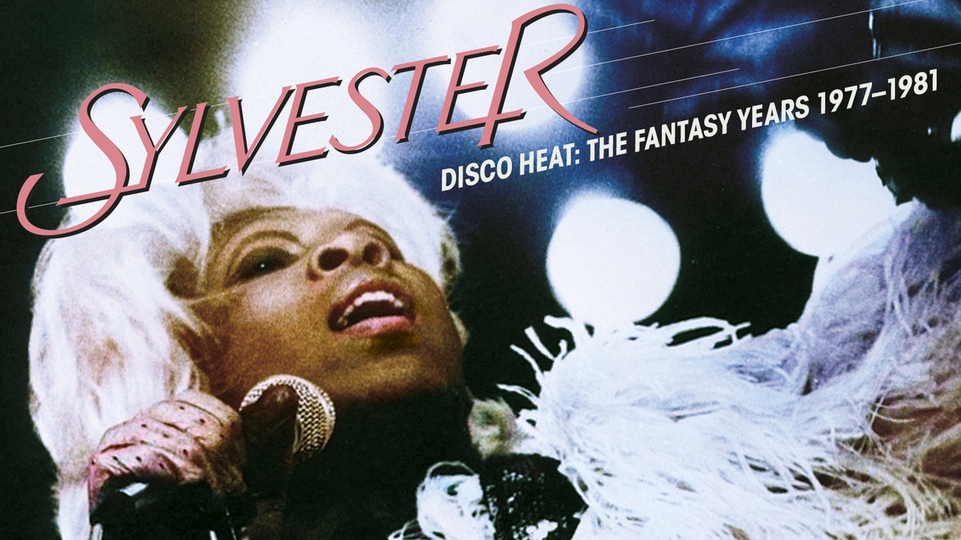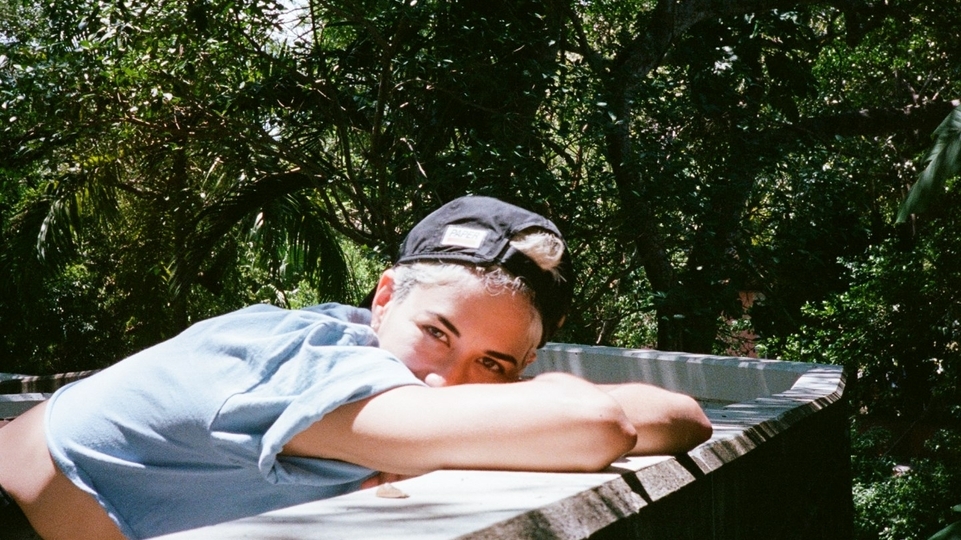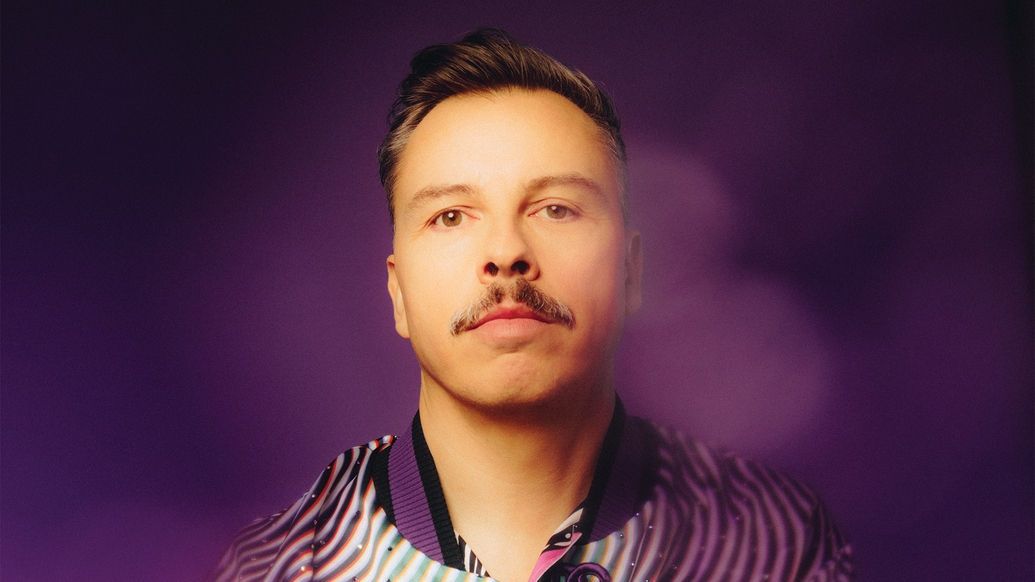
Purple Disco Machine: from the Grammys to Miami
Recent Grammy winner Purple Disco Machine hit the big time thanks to his accessible, irresistible take on house music with a disco twist. But his journey has been far from conventional. Here, Marke Bieschke speaks to the German DJ and producer about his early years in the underground, his love of disco, quitting music to become a school teacher, and how his return to the scene with a more relaxed attitude has fuelled his journey to the top
A massive vermillion space egg from the ‘80s has crashed through the club ceiling. Its pulsating fissure disgorges an ark’s-worth of fabulous creatures: go-go gazelles with sparkly Mohicans, flower-crowned lads sporting old-school Ray-Bans, sultry aliens writhing in fluorescent bikinis to a turbo-charged retouch of Lipps Inc.’s ‘Funkytown’. If the Star Wars Mos Eisley cantina invaded peak-era Ministry Of Sound and served up a fruity Sex On The Beach with a little cocktail umbrella, this would probably be the vibe.
The scene is, in fact, a 2023 Glitterbox party at Hï Ibiza, and in the middle of the neon bacchanal stands its unlikely captain, a charmingly reserved German with a perfectly trimmed moustache and a collection of geometrics-forward tropical shirts. As Purple Disco Machine, Tino Piontek has become a prime representative of disco’s wanton heritage at bigger festivals and clubs, while pushing forward his own universally appealing, sampladelic sound.
A dynamic producer with multiple albums of original compositions under his belt and streaming hits like ‘Hypnotized’ and ‘Fireworks’, he can pull off a smash singalong rework of the Human League’s ‘Don’t You Want Me’ and remixes for pop monarchs Lady Gaga, Dua Lipa and Kylie Minogue. His exquisitely star-dusted remix of Lizzo’s ‘About Damn Time’ just scored him a 2023 Grammy, in fact.
Yet he still geeks out over vintage Italo disco synths, and effortlessly holds an amped-up Tomorrowland crowd of thousands enraptured by chestnuts like Bronski Beat’s 1983 slow-burning gay coming-out anthem ‘Smalltown Boy’ — something those who were around when it was released could hardly imagine. It all may leave younger dancers asking, ‘How can I feel nostalgic for something I’ve never lived through?’
“It’s all the ’80s,” Piontek says over Zoom from his home studio in Dresden. “Everyone has a connection to the ’80s, from your childhood or your parents — everyone is linked up for some reason through the ’80s. It’s like a special feeling that’s playful but genuine. Other genres have become so serious over the years. EDM got so aggressive, with the build-up and the dirty drop. On the other side, tech-house is also quite serious, dark, and moody.
“Purple Disco Machine stands out among the other sounds,” he continues. “When I play the main stage at these festivals in the middle of all the EDM and tech-house guys, this is the only sound that is bright and joyful. We’re all together in the sunshine, even if the sun has already gone down.”
Yet this level of success didn’t come easy for Piontek, who spent years toiling at a professional electronic music career before jettisoning it all to follow his big purple muse into the bright lights of the disco Milky Way. Along the path he became a family man, dealt with mental health issues, and gained some heavy wisdom through major mistakes. Now he’s on the other side, doing what he loves for fun, blowing open sonic time portals and evolving his electro-funk sound to encompass glam rock sheen and Hi-NRG beats, with a possible live show on the way. As he’d be the first to say, “It’s been a journey.”
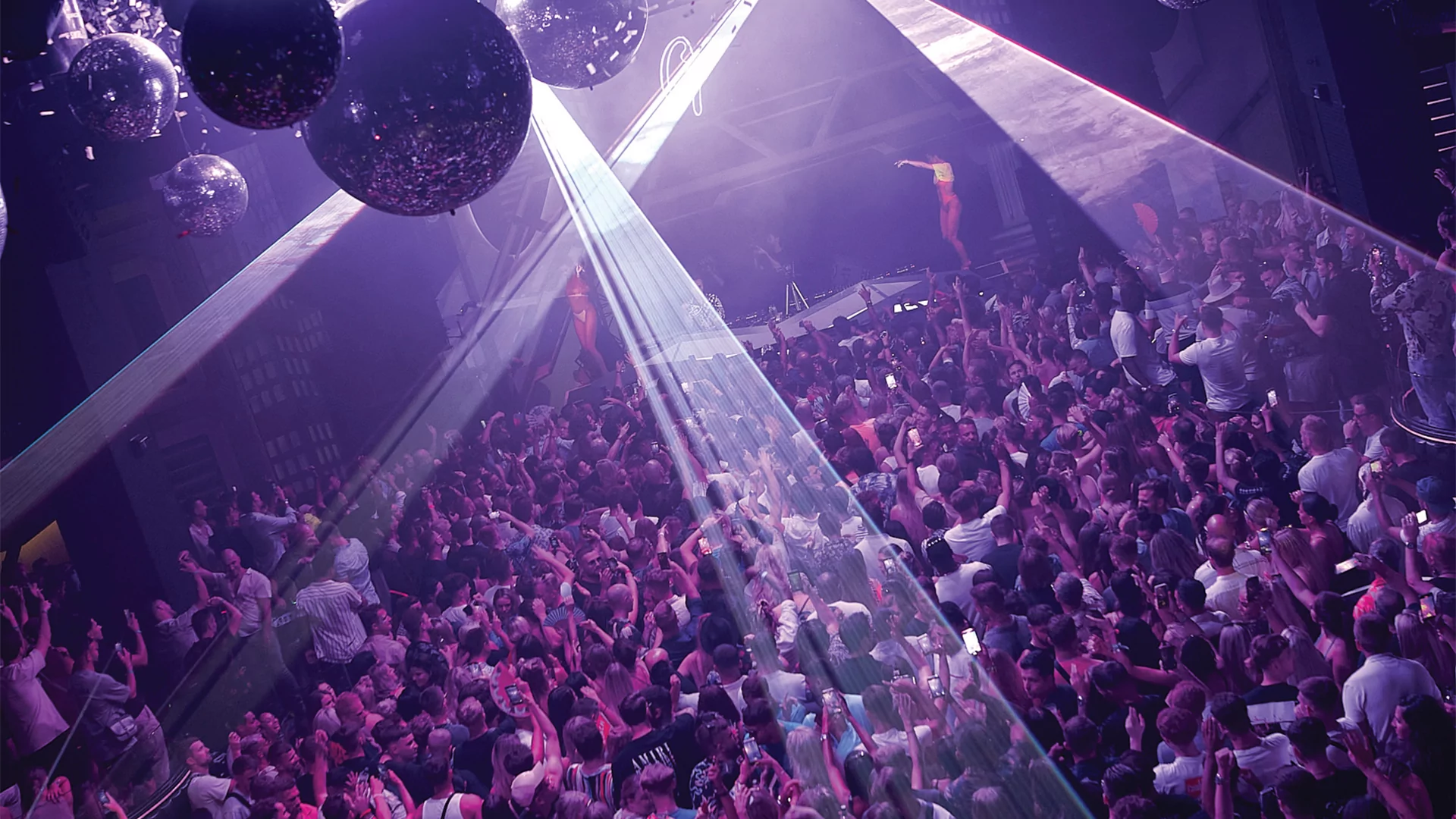
Purple Disco Machine productions may have broad allure, but Piontek’s love of music runs deep in an anti-authoritarian vein. Born in Dresden, he spent his childhood in East Germany before The Wall fell, when the highly censored radio waves were filled with inoffensive groups delivering ’70s rock cliches and sappy ballads. Still, the occasional electronic groundbreaker like Karat’s 1982 ‘Der Blaue Planet’ slipped through — along with an unexpected streak of Italo disco.
“The Rolling Stones were banned, but you could hear these Italo artists. I think it was because the music was not political, and because it was the disco sound, but not from the United States,” he says. The official restrictions didn’t phase his music-loving family. His father would drive to Czechoslovakia and Hungary to buy prog-rock records from the likes of Pink Floyd and Genesis on the black market, risking confiscation as he returned across the border.
After the border opened in 1989, Piontek’s family drove their antiquated car into the West — a snarl of traffic jams announced practically every other East German’s urge to do the same — and eventually to a chain record store in Bavaria called Media-Markt, where the walls were covered with vinyl and CDs, and the floor stuffed with musical equipment. He recalls his eyes popping out of his head at the glimmering hoard, and then facing one of the most agonising decisions of his life. What record to buy with the equivalent of €10 his father had given him? After an hour, Piontek recalls, he landed on ‘Sweat’ by Inner Circle, or another summertime reggae anthem just like it, cementing his love for positive, beach-ready tunes.
“I remember thinking, ‘I now have access to everything’,” Piontek says. “From there I started spending all my money on music. My first musical idol was Phil Collins. I collected everything from him — solo projects, Genesis, everything. The early works with brass sections were quite funky. Looking back, he had a similar career. He got a second chance when Peter Gabriel left and Genesis needed a new singer, and used this opportunity to become a huge star. I was also listening to a lot of disco, of course. Producers like Patrick Cowley and Giorgio Moroder were huge influences. I loved how they took the organic sound of a drummer or guitarist and mixed it with the synthetic technology that was being developed. I usually don’t like comparing my sound to other people, but it’s basically a mix of Giorgio Moroder, Patrick Cowley, and Daft Punk.”
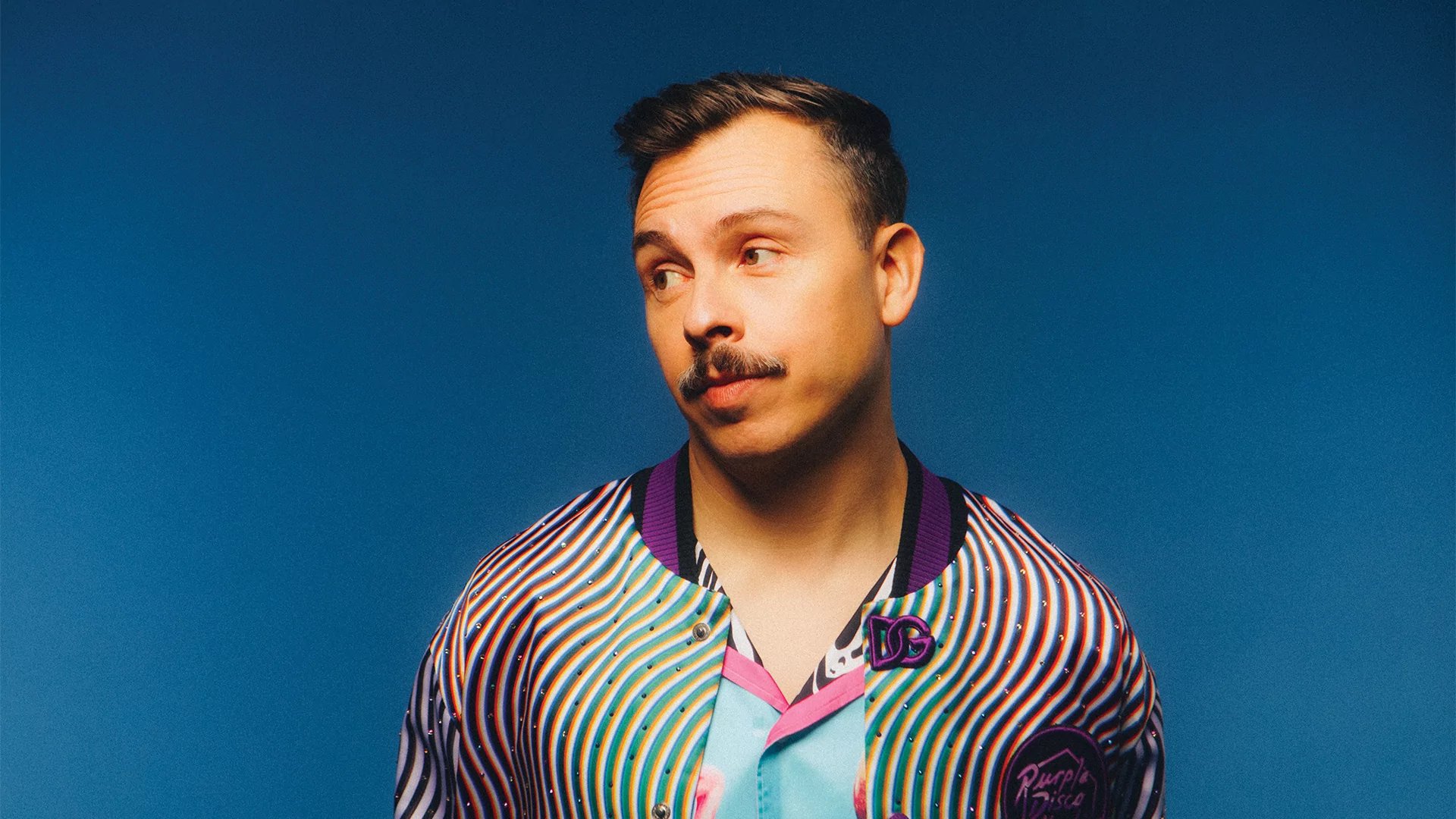
In his teens, Piontek attended warehouse raves in Dresden. He felt alienated from the cold, hard beams of techno emanating from mid-’90s Berlin and isolated by his own shyness at big social events. “I had become obsessed with French and filter house,” he says. “When I got ‘Homework’ by Daft Punk, I played it over and over. It showed me how disco and house could sound at this moment. There was a warmth and colour that spoke to me.” That hugely influential record sparked his interest in DJing. He bought a CD player, a mixer, and, as a poor student who couldn’t afford Technics, a rudimentary belt-driven turntable, which he still laughs about as “the worst”.
A Dresden venue called German Club opened in the late ’90s, and ironically became a nexus of French house. It was paradise for the budding DJ, who finally found a place where he could enjoy the music as well as the experience. By then, he was more interested in studying his craft than partying, though, standing in the corner and writing down the names of tracks to look up later, then taking the little slips of paper to his mentor DJ Tokn at the local record store for formative crate-digging sessions.
He also glommed on to one of the greats. Despite not being very interested in the German techno giant Sven Väth’s actual music, Piontek spent a good amount of time following him around to absorb his technique. “I think he’s one of the best DJs there ever was in terms of telling a story, bringing the energy up and down, and shaping the experience of a crowd,” he says. “His collection of tracks was perfect for what he was doing. I didn’t love his music. I totally got it, I’ve just never taken drugs in my life. But I would watch everything he did, and learned so much.” (This admission could be a sharp riposte for those who complain about parking on the dancefloor: that stock-still trainspotter might just become the next Purple Disco Machine.)
When another club, Grotte, opened near his home, he scored his first residency and went deep into his education, playing eight-hour sets, learning how to create an atmosphere for a headliner, and adjusting the tone to fit the slot. “I never understood why so many DJs would play hard, aggressive music at 3pm, in the sun,” he says. “I hear it and think, ‘what’s going wrong?’ To play the same set in the early afternoon or at 4am in the club, this is rubbish. For five years as a resident, I spent every night building up sets from something smooth to more energetic, with a variety of ups and downs along the way. Every time I compose a song, whether I’m making a radio song or a club song, I think, ‘How would a DJ play this song?’ If I wouldn’t play it in my sets, if it doesn’t help with the journey, I won’t release it.”
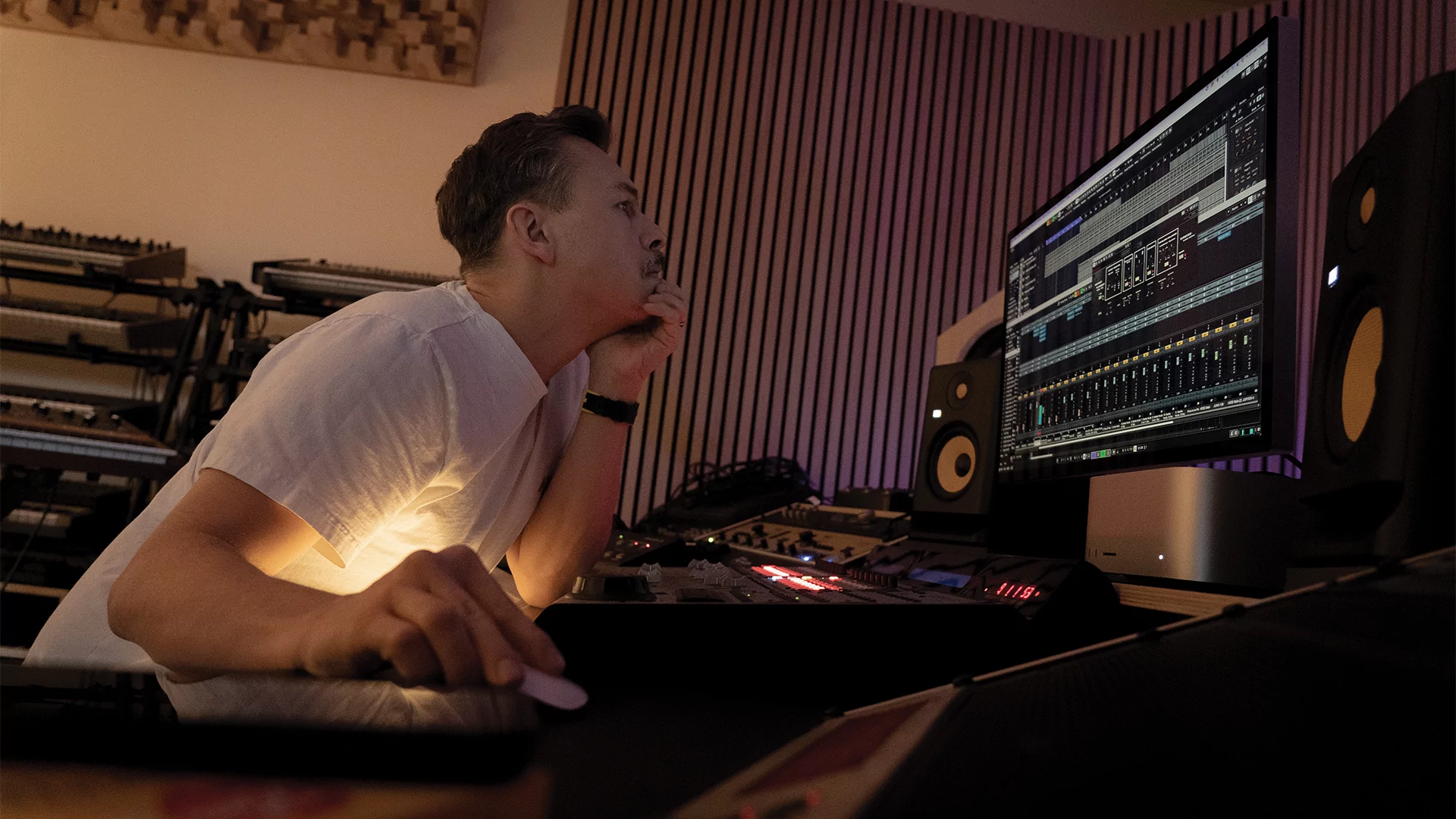
“I just went back to my roots. I said, ‘I don’t care if anyone plays this music, or releases it’. I just wanted to have fun with music again. I was completely free from the business and promotion side of things. A clean break.”
Learning how to DJ came with some guidance and fieldwork, but production was another matter altogether. He had never gone to music school or learned an instrument. And the ’90s, of course, had no YouTube tutorials, no presets, no Ableton. Piontek learned everything through trial and error, patching analogue synths and loading up DAWs like Fruity Loops, then Cubase (which he still uses) onto his desktop computer. This may be one of the reasons he’s so proactively forthcoming about his composition process, posting BTS videos guiding viewers through his programming techniques. “I just wasted like five years figuring everything out,” he says ruefully. “I could learn the same now in one year watching tutorials. On the other hand, I’m glad I started with hardware and synthesisers, understanding how it all works.
“You don’t need a synthesiser now to make a great sound,” he continues. “If you have the right ideas and creativity, you can compose amazing songs on Ableton with two VST plug-ins, no problem. But I’m really happy I learned the handcraft in producing music and playing vinyl. Every year, I have this idea to do a vinyl-only tour. No promoter is ever interested in it. I get it, people don’t care if the music is coming from vinyl or USB. It’s all about the music, that’s great. But I really miss this haptic feeling. I still go crate-digging on tour. I have like 20 new vinyls from the past month I haven’t played out yet. I love that anticipation. It’s part of why I started doing the Sunday Sessions mixes online during the pandemic.”
Once he felt he had mastered professional production, Piontek started to ghost produce for other DJs and launch his own projects under various names. This included Stereofunk, a successful act by most measures, which yielded two albums, a raft of singles, regular festival bookings, and a major label signing in its 15 active years. With Stereofunk, he developed the crisp percussion, precision bass attack, and immersive dynamics that would mushroom into
the Purple Disco Machine sound, while tip-toeing towards the disco sample-collaging that became his trademark. You can feel him reaching around with his Stereofunk output to find a way to convey his love for warmer expressions, while still slotting into the style of the times, especially on bouncy later cuts like ‘El Patron’ and ‘Brasina’.
Those times were changing, and the blinding white wave of EDM obliterated the viability of a career making housier sounds. “By the end of the 2000s, house was dead. No one booked me as a DJ. Everyone was playing hardcore EDM or minimal techno,” he says. “My agent told me I would have to play more EDM if I wanted to keep going. I said, ‘I can’t do it, I just hate this music’. I was struggling a lot. I couldn’t pay my bills. I had to make a decision. So I actually retired. I said, ‘OK, that’s it’. I stopped playing shows at the end of 2008. I worked as a teacher in an elementary school to get by. I was a bit frustrated, to be honest. I took ghost production jobs for dance and pop music artists, I wrote advertising music, but I didn’t play any gigs or release any of my own music.”
And yet he couldn’t stop making music for his own pleasure, chopping up his favourite funk and disco cuts over driving rhythms, fitting them back together like puzzle pieces. “I just went back to my roots. I said, ‘I don’t care if anyone plays this music, or releases it’. I just wanted to have fun with music again. I was completely free from the business and promotion side of things. A clean break. I started goofing around with friends thinking of a name for what I was doing: I like Prince, so ‘Purple Rain’, naturally. That evening we were listening to Miami Sound Machine with Gloria Estefan, so that was where the ‘machine’ came from. ‘Purple Disco Machine’, OK! I created a little logo in MS Paint, that looked really nice. It had palm trees. I thought, ‘this fits with the music.’
“I started making the kind of tracks I made 20 years earlier. Downbeat, downtempo disco, 110 BPM, daytime music. I played beach parties in my hometown. The first gig I played as Purple Disco Machine was a sunset party. It was so fun. This is what I really missed when I had to do EDM shows and play shit music for money. I kept producing songs, this time following my own instincts. In 2012, a song called ‘My House’ got signed by OFF Recordings — it changed everything. I got so many booking requests, so much positive response.”
The timing of this renewed interest wasn’t the best for his personal life initially, he admits. “It was actually terrible timing because my daughter was born three months earlier. I had just told my wife, ‘OK, I’m done with music. I’m a dad now. I’ll never play big shows anymore.’ After ‘My House’ hit, I said to my wife, ‘I think we might need to talk again’.
“What I learned from this was that my most creative time was when I didn’t feel any pressure,” PDM adds. “I wasn’t signed to a major label, I had no booking agency, there were no expectations on the music I released. New name, new project, no one knew who I was. Just me doing what I love. Maybe that’s the reason the music became successful compared to the music I did 10 years earlier.”
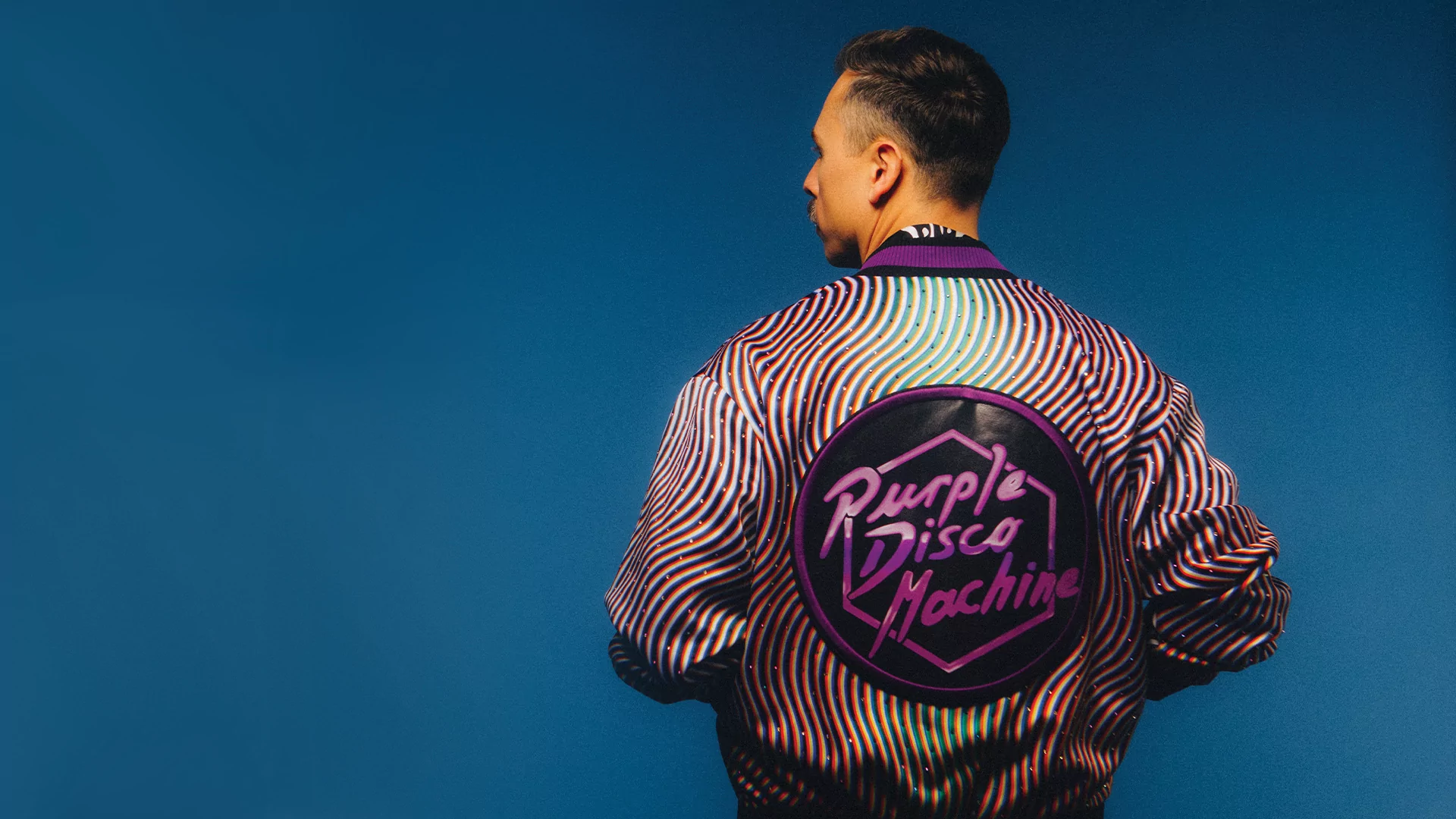
In retrospect, the original Purple Disco Machine logo was part of a musical manifesto. The palm trees echoed both the graphics of disco behemoth Casablanca Records and the logo of the legendary Island Records, the Jamaica-based UK label that established itself in the 1960s releasing sunny reggae like ‘My Boy Lollipop’ and engineering Bob Marley’s breakthrough, before becoming an international juggernaut in the 1980s with acts like Frankie Goes To Hollywood, Grace Jones, and U2. The logo has since evolved into a gleaming iteration of the original bespoke ‘Purple Rain’ font over a simple hexagon, which might wink at the chemical makeup of popular party favours. Yet the direct connection to sunny sounds remains: Piontek makes bright, accessible tunes that set the dancefloor alight.
He wasn’t the only one to foreground this aesthetic in the late 2000s. A wave of disco re-edits and recombinant house had been gaining steam since 2008 with acts like Psychemagik, Tensnake and Todd Terje, abetted by a host of white label releases that recontextualised soulful classics for 21st century dancefloors. Disco purists like longtime iconoclast DJ Harvey and the out-and-proud Horse Meat Disco crew played the real thing to big crowds.
And of course, disco never went away. Black producers like Derrick Carter and Quentin Harris were still making straight-up house music, which is what disco became when the big-label money ran out. And Detroit’s Theo Parrish continued cutting funk and soul up into disco ‘Ugly Edit’ diamonds. (A ‘disco revival’ is just what it’s called when white people remember disco exists, a wise DJ once said, and Piontek has always been quick to acknowledge his queer and Black forebears.)
Whereas most contemporary disco edits and collages were laidback, ruminative affairs that dribbled off the corners of the dancefloor into a pool of half-recalled echoes, Purple Disco Machine aimed squarely for the solar plexus — “I always start with a rhythm and a bassline,” Piontek has said — and unabashedly embraced pop. For sure, first hit ‘My House’ played into the more expansive side of things, padding along to a swoony groove nicked from Judy Clay and William Bell’s 1968 ‘Private Number’, with a pitch-bent synth-line pulling things into focus, and a troubling yet perfect clip from a sermon by the infamous Reverend Jim Jones, of the 1978 Jonestown Massacre. (Piontek revisited the track in 2017 to whip it into poppier shape, retitling it ‘Devil In Me’, and adding vocals by Duane Harden and Joseph Killington.)
Around the same time as ‘My House’ came ‘Let It Whip’, which fleshed out the spinal chord progression of Michael Jackson’s ‘Billie Jean’ with wedding reception favourite ‘Let It Whip’ by the Dazz Band. Not exactly esoteric nuggets, but irresistible fun, especially with that burbling bass.
These releases were followed by the even more upbeat and audacious ‘Move Or Not’, bridging a musical gulf by mixing 1994 Eurodance single ‘U & Me’ by Capella with Sugarhill Gang’s foundational 1979 hip-hop track ‘Rapper’s Delight’ – and adding a lot more cowbell. Of course, ‘Rapper’s Delight’ itself is built on samples of Chic and Love Deluxe, and Capella’s chart hit catalogue nabs bits from Siouxsie and the Banshees, Steve ‘Silk’ Hurley, Alphaville...
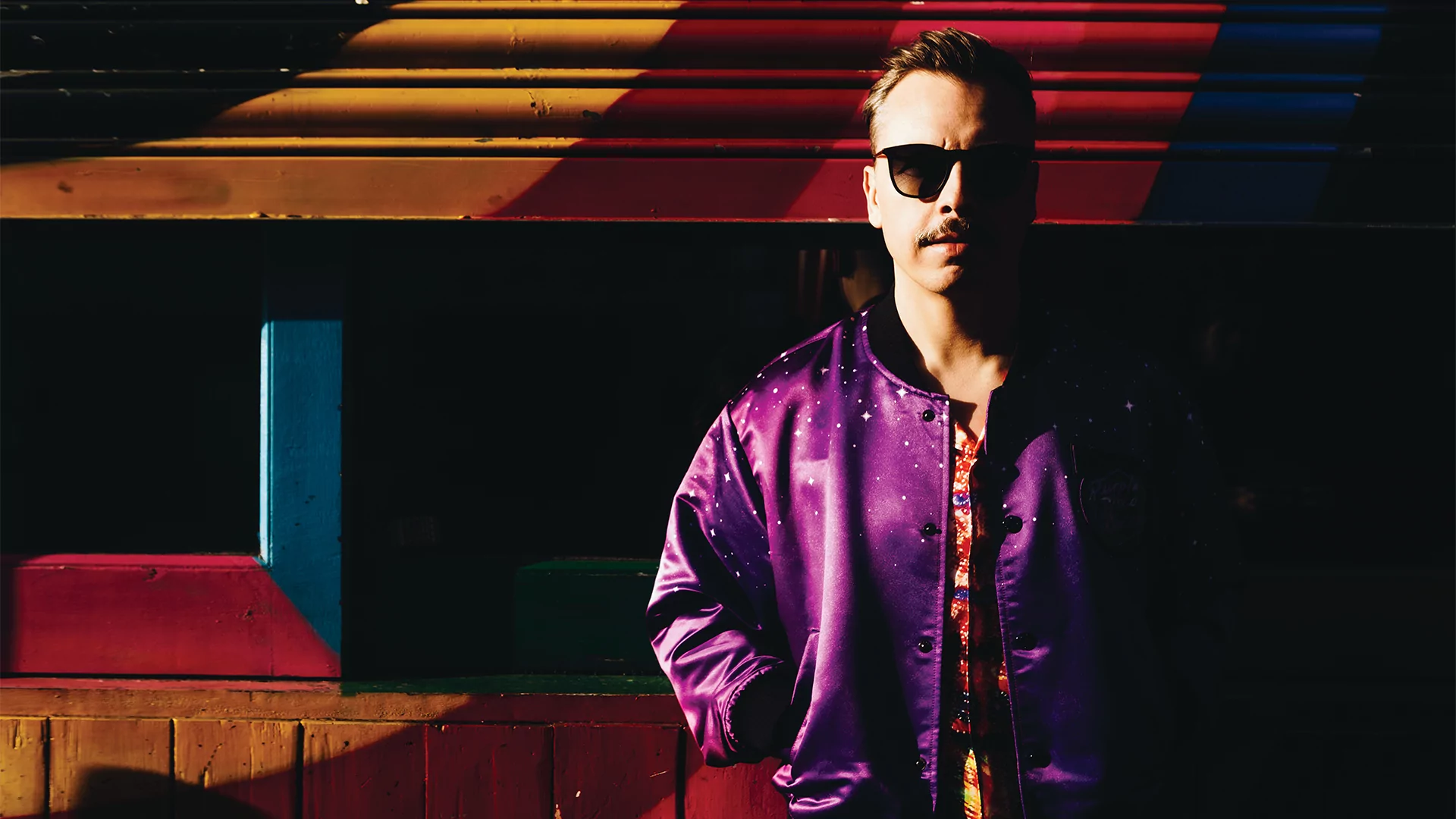
“A Purple Disco Machine show is just an escape from your reality, your normal life, two or three hours to enjoy the pleasures that disco and funk can bring. I would love to have three hours of this on the dancefloor”
It's easy to slip through a bewildering hall of mirrors if you listen too hard to a Purple Disco Machine track, which can refract four or five decades of flashbacks. (During a 2023 set, he pops on his 2017 recut of The Shapeshifters' 2004 anthem ‘Lola's Theme’, which was built around Imarri's 1992 ‘Let Me Love You’ and Johnny Taylor's 1982 ‘What About My Love’, for instance.) The wild archeology always comes with a sugar-rush of fun, which has propelled Piontek into the upper echelons of touring and recording dance musicians. Beyond whatever sample is used, his original hits like ‘Hypnotized’, ‘Fireworks’, and ‘Dopamine’ from 2021 album ‘Exotica’ display a pure pop sensibility that cleverly mines dance music vocabulary as only a deep listener can.
“I have no idea why Purple Disco Machine caught on so fast,” he says. “Some people say I have a particular sound and you can recognise my songs after a few seconds. I don’t sit in the studio and say, ‘Let’s make a Purple Disco Machine song’. Even when I try something different it ends up with the Purple Disco Machine sound, it’s naturally how things come together. But I more and more feel that after the last five, six, seven years, for most of the people life has gotten more complicated. There’s a lot of issues in the world, a lot of things have happened. We need something positive that we can enjoy without thinking too much about our problems.
“That’s why this genre is back on the radar, back on the radios again, and I’m proud to be a part of it,” he continues. “I try to keep my music positive and happy, simple and easy to understand. Just feel-good music. That’s something I want to express to the crowd when they listen to the music at home, or on the dancefloor. A Purple Disco Machine show is just an escape from your reality, your normal life, two or three hours to enjoy the pleasures that disco and funk can bring. I would love to have three hours of this on the dancefloor,” he laughs.
For his next album, Piontek is tweaking his approach by listening to more ’70s glam rock alongside the Hi-NRG sound of the ’80s. (He calls it “an evolution, not a revolution”.) With longtime collaborator Matt Johnson, Jamiroquai’s jazz-funk keyboardist, he’s been tracking down the vintage synths used in original productions on Ebay and building out a richer sound. “I think the most complicated thing for musicians is to evolve your music. It’s important to have people you trust to work with to try new things. Matt’s a really professional player, so he can really bring ideas to life. An idea I have in mind, I just tell him and within seconds he’s playing it. For me it takes 10 times longer to recreate something on MIDI — I’m OK, but he’s a genius.
“That’s why for me it’s such a pleasure to work with proper musicians — a bassist, a guitarist, a jazz drummer like Derrick Mackenzie — to make my sound more organic. When I work with vocalists it’s definitely a collaboration, not someone just telling the other what to do. During the pandemic, Matt and I sent stems to each other and worked that way. But once we could get together, we spent four whole days together just nerding out. It was one of the best times of my life.”
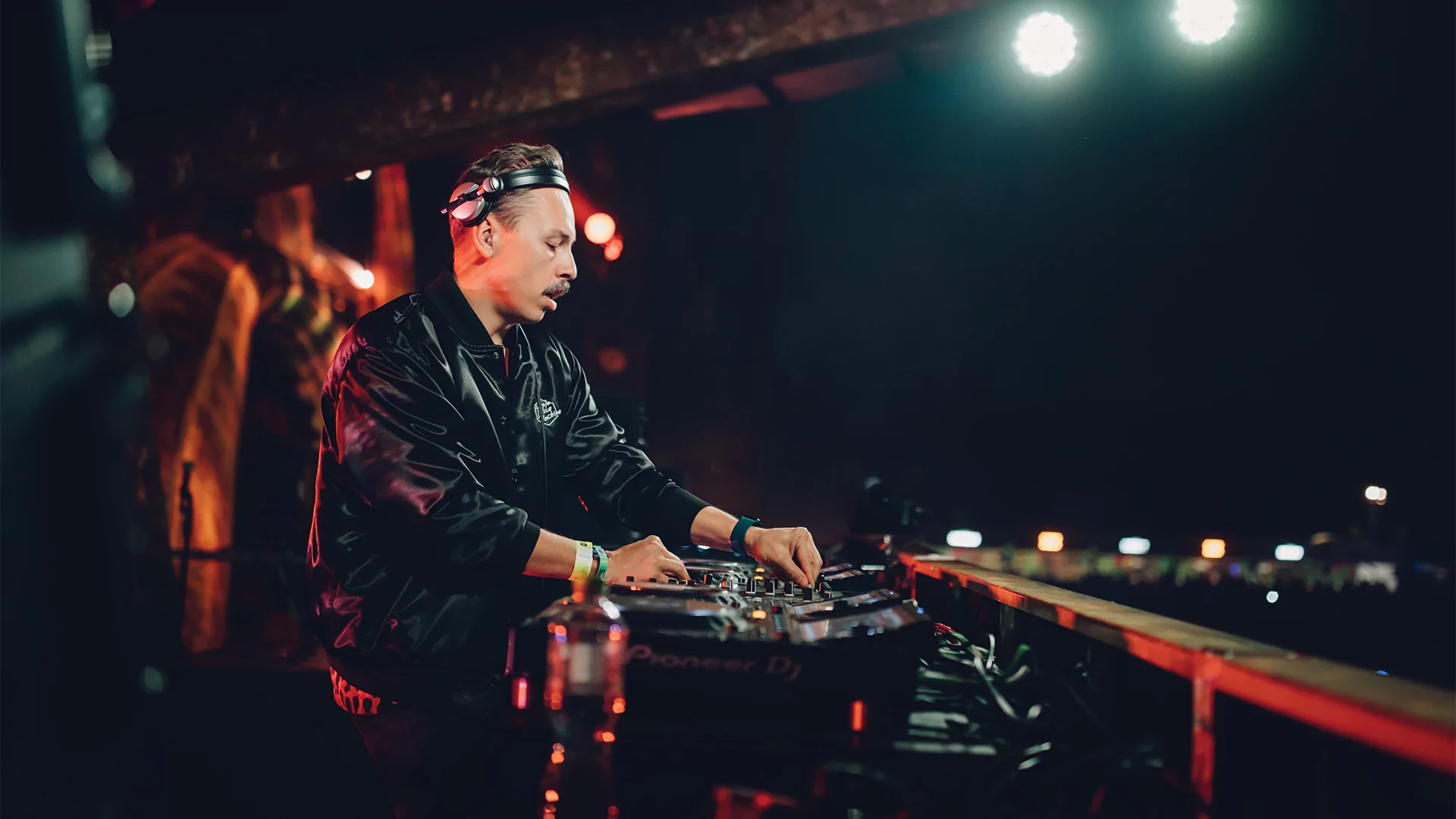
With his interest in organic sounds, is there a possibility of a live Purple Disco Machine performance, complete with Rock God guitar poses, platform boots, and flashing stadium lights? “We’ve had this idea for years, a whole experience, a band called Purple Disco Machine. It’s not easy to tour with a full band when you’re used to travelling as a DJ by yourself or with a small crew. But it’s something that I really want to do. We’re actually going to do it as a test project in my hometown this September, a special concert with a few musicians, a few singers.
“It’s actually a stupid idea to do it in your hometown,” he adds with a twinkle in his eye, “because if you fail then you fail in front of all your friends and family. But hopefully this won’t happen.”
On the very small chance he does happen to fail, even with a loaded discography of crowd favourites, it’s something he’s learned to overcome with experience. “I’ve had so many of these moments, and I’m also really thankful for them. If everything is fine, you go off stage thinking, ‘I’m the best guy ever’. But if you fail, if you lose the crowd, then you start to really think about yourself, what you could do better, how you can adjust your set.
“This happened a lot back in the day when I played EDM festivals, everyone expected me to play EDM songs. But I played house music and everyone was just standing around. I could see in their faces, ‘Come on, this is so boring, I don’t get it. Where is the drop?’ Well, I looked at them and thought, ‘You fucking idiots, you don’t understand good music’. It was how I learned I didn’t want that situation anymore.”
He also learned to just stay true to yourself, he says. “Hypes will come and go, and if you don’t follow your own path, you’ll be left behind. You’ll always be the second person doing this. Just do your own stuff. Follow your soul and your time will come. I was just waiting. I never expected this kind of success. I could never imagine what happened the last few years. Everyone starting out making music dreams of this kind of career, travelling the world and playing everywhere and all the cheering.
“I think the reason Purple Disco Machine is still here is because I made all the mistakes 15 years ago,” he continues. “I signed to a major label with a really rubbish deal that I would never sign again. I was trusting everyone who told me big things. With Purple Disco Machine, I said, ‘OK, I got a second chance. My life has changed, I have a family now. If it doesn’t work out, I’m OK.’ I’m surrounded by the right people, I’m way more chill.
“Sometimes, though, I still think I’m a pretender, and maybe in two or three years people will realise that I’m just a random guy who had a lot of luck, a guy who can’t play any instruments. Hopefully no one will realise I don’t really know what I’m doing.”
He’s being self-deprecating there, but the pressures of success can weigh as heavy as the struggle to get to the top. In 2018, Piontek cancelled a tour due to exhaustion. “When everything started going crazy for me in 2013, every year I would play more and more shows. I was struggling with my work-life balance and struggling with mental health issues. I just remember it was 2018, I was sitting in a hotel room in Mexico. My son had to go to the hospital back in Germany, it was something serious. I just thought, ‘What am I doing here? I’m 24 hours away from my family’. My wife was alone with the kids for months, I was touring all the time. It was causing so much stress. My wife said, ‘One more year like this, we will have to break up’. That’s when I realised: I don’t want to come back from touring and have no family.
“In 2019, my wife and I sat down and we made a decent plan,” he continues. “What I learned in this moment is to build your business around your private life. Before I just had my business, and my private life squeezed into it. This has totally changed. At the beginning of every year, we map things out — when and where we want to go on holiday, all the important dates I should plug in, like birthdays, anniversaries. These are the most important things; no one can call me on the blocked days. Even if it’s a weekend with something like Tomorrowland or a huge festival. This is really important for me. Since then things have really chilled. I’m still learning how to do it, but my time with my family is so precious — even with all the success I want to be with them, too.”
Fortunately, no blocked-off dates will prevent Purple Disco Machine from playing the DJ Mag party at this year’s Winter Music Conference. “I’m totally excited,” he says, “but to be honest I’ve never been to the Winter Music Conference in my life, so I’m very curious about how it all works. I love Miami, especially when it’s grey and cold everywhere else, and I know there will be a lot of friends there. There’s few better things to do than spin great music for friends in the sunshine.”


